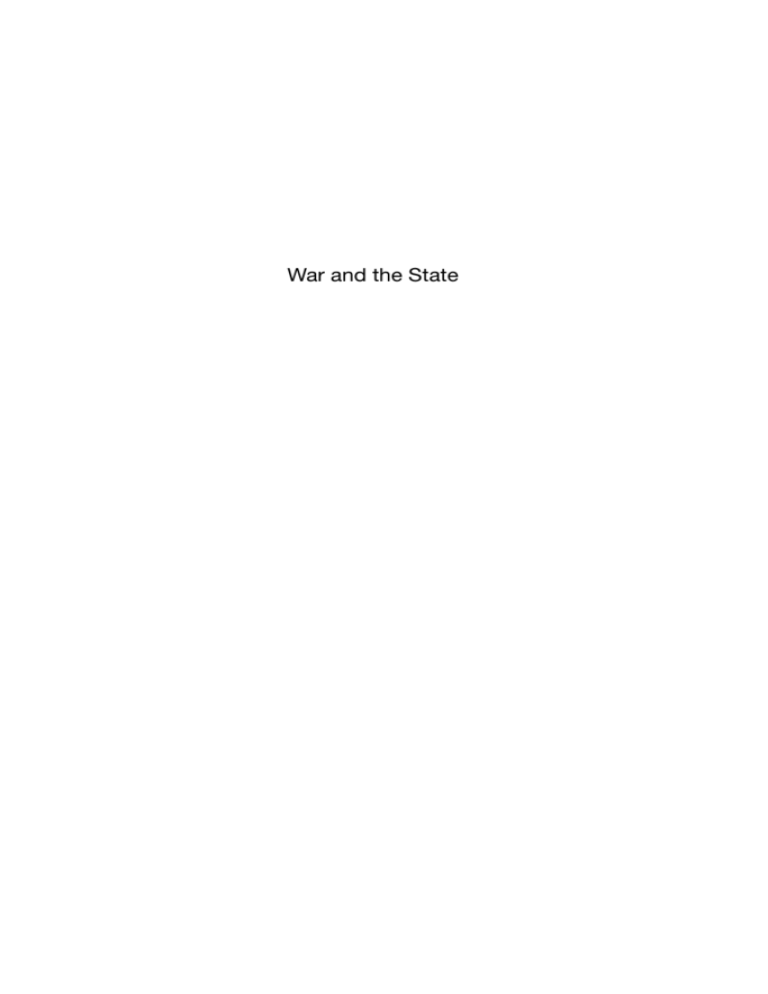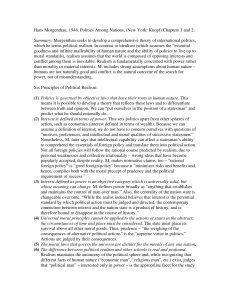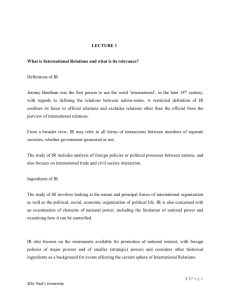
War and the State
War and the State
The Theory of International Politics
R. Harrison Wagner
THE UNIVERSITY OF MICHIGAN PRESS
Ann Arbor
For Rosi
Copyright © by the University of Michigan 2007
All rights reserved
Published in the United States of America by
The University of Michigan Press
Manufactured in the United States of America
c Printed on acid-free paper
2010
2009
2008
2007
4
3
2
1
No part of this publication may be reproduced,
stored in a retrieval system, or transmitted in any form
or by any means, electronic, mechanical, or otherwise,
without the written permission of the publisher.
A CIP catalog record for this book is available from the British Library.
Library of Congress Cataloging-in-Publication Data
Wagner, R. Harrison (Robert Harrison)
War and the state : the theory of international politics /
R. Harrison Wagner.
p.
cm.
Includes bibliographical references and index.
ISBN-13: 978-0-472-09981-8 (cloth : alk. paper)
ISBN-10: 0-472-09981-7 (cloth : alk. paper)
ISBN-13: 978-0-472-06981-1 (pbk. : alk. paper)
ISBN-10: 0-472-06981-0 (pbk. : alk. paper)
1. International relations—Philosophy. 2. War. 3. State, The.
I. Title.
JZ1316.W34
327.101—dc22
2007
2006028159
Contents
List of Figures
vii
Preface
ix
Chapter 1. The Theory of International Politics
1
Theories, Arguments, and Explanations 2
Offensive Realism 13
Defensive Realism 15
Structural Realism 17
Anarchy and War 21
Hierarchy and Peace 33
Realism’s Competitors 36
Generic Realism 48
Chapter 2. Reason of State
53
Classical Realism, Social Norms, and Raison d’État 53
The State of Nature 65
The Prince 71
A World of Leviathans 76
The Market 89
Recurring War, Perpetual Peace 94
From Raison d’État to Realism 100
Chapter 3. Violence, Organization, and War
Bargaining 107
Bargaining and the Use of Force 112
The Protection Business 118
The Social Contract 120
Anarchy and Hierarchy Reconsidered 122
The Global Constitution 125
Peace and the State 127
105
vi
CONTENTS
Chapter 4. Bargaining and War
131
Warring Predators 131
Let’s Make a Deal 137
Bargaining and Fighting 143
Bargaining, War, and Alliances 154
Bargaining, War, and the Balance of Power 161
Bargaining and the Recurrence of War 170
Chapter 5. Enforcing Agreements
173
The Struggle for Power 175
Incentives to Attack First 177
Bargaining over the Distribution of Power 184
Chapter 6. A World of Commonwealths
197
Taming Predators 202
A Mixed World 206
Domestic and International Politics 209
Writing the Global Constitution: Top-down
or Bottom-up? 217
Chapter 7. Summing Up
235
References
239
Index
255
Figures
1.
2.
3.
4.
5.
6.
The Prisoner’s Dilemma
The Stag Hunt
Ant vs. Human Social Organization
A Coordination Game
Choice between a Lottery and a Sure Thing
Choice between a Contest and a Bargain
29
31
46
55
138
140
Preface
The central question debated by students of international politics is the
relation between organized violence and political order at the global level,
and this book is mainly concerned with what political scientists in the
United States have had to say about that subject. As current events remind
us, however, this is a question that pertains to all politics and not just
international politics, and therefore I believe that the distinction between
international and domestic politics that underlies the division of intellectual labor among scholars who study them has interfered with our understanding of both and has left us poorly equipped to understand both interstate and intrastate con›icts since the end of the cold war. Thus, although
the main focus of this book is the theory of international politics, I hope
that it will be of interest to students of comparative politics, history, and
political theory as well.
The most in›uential advocate of distinguishing between international
and domestic politics has been Kenneth Waltz, and my objective in writing
this book is perhaps most directly comparable to the objective he had in
writing his well-known book Theory of International Politics (1979). In
that book Waltz tried to identify what the subject of the study of international politics was, to state its main properties, and to indicate how our
understanding of it could be improved. Those are also my goals.
A great deal has been learned about international politics since Waltz
wrote his famous book, but there are still many disagreements about how to
understand it. Anyone who wants to understand those disagreements must
read widely across the journals and subdisciplines of the social sciences, and
some of the relevant literature is inaccessible to people without training in
formal modeling or unwilling to take formal models seriously. My goal is to
make this material accessible to as broad an audience as possible.
Knowledge progresses by trial and error. Thus intellectual progress
requires a common understanding of what counts as a mistake, scholars
must make it easy for others to spot their mistakes, and they must be motivated to look for them and correct them. I believe that these conditions are
only imperfectly satis‹ed among students of international politics in the
United States. As a result, while there is widespread agreement that much
that Waltz wrote must be revised, there is much less agreement about what
x
PREFACE
revisions should be made. This fact not only impedes intellectual progress
but also diminishes the ability of scholars in the ‹eld to speak with authority to a broader audience. By clarifying many of the issues that divide students of international politics, I would like to foster a more productive dialogue among them.
Many political scientists believe that the answers to the questions that
divide them are to be found in the philosophy of science. Unfortunately,
philosophers of science disagree about many things, and thus attempts to
settle disagreements among political scientists by appeals to the philosophy of science just make those disagreements more intractable. In chapter
1, I argue that this emphasis on the philosophy of science is misplaced and
that the main problem is instead the willingness of political scientists to
tolerate incomplete arguments. I then reconstruct and evaluate the main
arguments offered by the competing schools of thought that have divided
students of international politics in the United States.
The central ‹gure in this story is Realism, which has dominated the
study of international politics in the United States since World War II to
such an extent that it has shaped the thinking even of those who disagree
with it. Both Realists and many of their critics assume that the world consists of a collection of independent states, and their disagreements focus on
whether and how wars among them might be prevented. Many people
assume that, since domestic political institutions can prevent civil wars,
interstate wars could only be prevented by political institutions at the
global level, and debates between Realists and their critics often focus on
whether that is a realistic prospect. One of the main messages of this book
is that this framework of thought misleads us. Wars do not require states;
they merely require armies. Armies can exist without states, and states are
among the possible by-products of con›icts among armies. If states exist,
wars can occur within them, between them, or across the boundaries that
separate them, and the result can be more states, fewer states, or states
with different boundaries. Thus a world of independent states is not a
world without a global order—the independent states are the global order,
and the most important question about war is how effective such an institutional structure can be expected to be as an alternative to violence.
To answer this question, we need to understand the relation between
organized violence and political order of any sort. This is a much broader
question than the one that has come to be the focus of contemporary Realism and its critics, and I will argue in chapter 2 that it is the central question raised by the intellectual tradition from which modern Realism was
derived, which is often called raison d’état, or reason of state. To think
productively about it, one must understand both violence and how people
organize themselves to engage in it. That is the subject of chapter 3.
Preface
xi
Organized violence makes predation pro‹table, which in turn leads to
violent contests among competing predators. But contests among predators can increase the bargaining power of their prey and thus over time
diminish the gains from predation. The European state system, I argue,
was the product of such a process. Chapters 4 and 5 discuss why competing predators ‹nd it dif‹cult to avoid violent con›icts, and chapter 6 discusses whether the states that emerge from recurring violent con›icts
among predators could provide the basis for a peaceful political order at
the global level.
Throughout the book I have tried to indicate not only what we know
but also what we do not know, and therefore I have tried both to provide
references for readers who want to pursue these topics further and to identify speci‹c questions to which we currently do not have good answers.
There are undoubtedly many errors of my own to be found in the following pages, and I can only hope they will be productive ones. Right or
wrong, little if any of what follows is original, and the parts that are original, if any, are also the parts that are most likely to be wrong. If a mistake
that I have made motivates a reader to ‹gure out exactly what the mistake
is and to correct it, then my purpose will have been served.
I have taken the ideas in this book from so many people that acknowledging them all poses a serious accounting problem, and I apologize if I
have inadvertently omitted someone from the footnotes. But footnotes
could not possibly convey the extent of my indebtedness to James Fearon
and Robert Powell, whose writings have been the source of many of the
ideas in this book and who have also repeatedly caused me to experience
the bracing sensation of being unambiguously and embarrassingly wrong.
Nor can footnotes adequately record my debt to Roy Licklider for inviting
me to participate in a project on civil war termination, which ‹rst led me
to appreciate the cost of separating the study of international politics from
the study of domestic con›ict.
I also owe a great deal to a number of remarkable scholars who, while
they were my colleagues at the University of Texas, were also my teachers.
If any of them should happen to read this book they will recognize their
in›uence at many places in it, and though I will refrain from listing their
names here, I would like to express my gratitude to all of them for their
intellectual generosity.
I am also grateful for the comments and encouragement of a number
of people who read part or all of the manuscript, and I would like especially to thank Michael Brenner, Scott Gartner, Hein Goemans, and
Robert Rauchhaus for their extended comments. I thank also all the students who, over the years, have been involuntary audiences for previews of
portions of this book.
xii
PREFACE
A semester’s leave from teaching funded by a Dean’s Fellowship from
the College of Liberal Arts at the University of Texas at Austin helped
make my work on this book possible.
Portions of chapter 3 originally appeared in R. Harrison Wagner,
“Bargaining and Con›ict Management,” in Multiple Paths to Knowledge
in International Relations: Methodology in the Study of Con›ict Management and Con›ict Resolution, ed. Zeev Maoz et al. (Lanham, MD: Lexington Books, 2004). I gratefully acknowledge permission from Lexington
Books to reprint selections from that work here.
Portions of chapters 4 and 5 originally appeared in R. Harrison Wagner, “Bargaining, War, and Alliances,” Con›ict Management and Peace
Science 21, no. 3 (fall 2004): 215–31. These passages are reproduced by
permission of Taylor & Francis Group, LLC, http://www.taylorandfran
cis.com.









